
GEOLOGIA CROATICA
Scope & Guideline
Elevating Geological Research for All
Introduction
Aims and Scopes
- Geological Mapping and Stratigraphy:
The journal features studies on geological mapping and stratigraphy, particularly in the context of the Adriatic region and surrounding areas, providing insights into geological formations and their historical significance. - Geochemistry and Mineralogy:
Research on geochemical and mineralogical characteristics of various deposits, including ore and sedimentary deposits, is a core focus. This includes studies on trace elements, mineral resources, and their potential for exploitation. - Palaeontology and Palaeoenvironmental Studies:
Papers investigating fossil records and reconstructing past environments are prevalent, contributing to the understanding of evolutionary processes and historical climate changes. - Hydrogeology and Environmental Geology:
The journal emphasizes hydrogeological studies, particularly in karst regions, exploring groundwater resources, contamination issues, and the impact of geological formations on water quality. - Tectonics and Structural Geology:
Research addressing tectonic processes and structural geological formations is essential, shedding light on the dynamics of the Earth’s crust in the region. - Remote Sensing and Geospatial Analysis:
There is a growing emphasis on utilizing remote sensing technologies and geospatial analysis for geological mapping, landslide assessments, and resource management.
Trending and Emerging
- Hydrochemical and Isotopic Studies:
There is a notable increase in studies focusing on hydrochemical and isotopic investigations, particularly in karst regions. These studies are crucial for understanding water resources and contamination issues, especially in light of climate change. - Geological Impact of Human Activities:
Research addressing the geological impact of human activities, such as mining and urban development, is on the rise. This reflects a growing concern for environmental sustainability and resource management. - Advanced Remote Sensing Applications:
The application of advanced remote sensing technologies is trending, particularly for geological mapping and landslide analysis, indicating a shift towards high-tech methodologies in geological research. - Palaeoenvironmental Reconstruction:
The trend towards detailed palaeoenvironmental reconstructions using various geological and biological indicators is emerging strongly, providing insights into historical ecosystem changes and responses to climate shifts. - Geothermal Resource Assessment:
Research on geothermal resources, including their hydrochemical characteristics and potential for sustainable energy, is becoming more prominent, aligning with global trends towards renewable energy sources.
Declining or Waning
- Traditional Mineral Exploration:
While mineral exploration remains important, there has been a noticeable decline in papers solely focused on traditional exploration methods. The shift seems towards more integrated approaches that include environmental considerations. - Sedimentology of Non-Marine Deposits:
Research focusing exclusively on non-marine sedimentology appears to be decreasing, possibly due to an increasing interest in marine and transitional environments that provide broader ecological insights. - Paleoclimatology Studies:
Although still relevant, dedicated studies on paleoclimatology have become less frequent, as researchers may be integrating these topics into broader environmental and geological assessments. - Geological Hazards Assessment:
There has been a reduction in the number of papers specifically dedicated to geological hazards, such as landslides and earthquakes, as these topics are increasingly covered within broader environmental studies.
Similar Journals

Moscow University Geology Bulletin
Exploring Earth's Mysteries Through Rigorous ResearchMoscow University Geology Bulletin, published by SPRINGER INT PUBL AG, is a prominent platform for disseminating critical research in the field of Earth and Planetary Sciences. With an ISSN of 0145-8752 and an E-ISSN of 1934-8436, this journal is well-regarded for its contributions to diverse geological studies and interdisciplinary advancements that shape our understanding of the planet. The journal has established itself in the academic community, particularly noted for its ranking in the Q3 category within Earth and Planetary Sciences as of 2023. Despite its limited open-access options, the Moscow University Geology Bulletin remains an essential resource for researchers, professionals, and students through its well-curated articles and synthesis of geoscientific knowledge. With annual volumes converging from various years, including significant years like 2012 to 2024, it aims to uphold its mission of fostering scholarly dialogue and innovation in the geosciences.
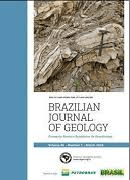
Brazilian Journal of Geology
Advancing Geological Knowledge for a Sustainable FutureBrazilian Journal of Geology, the flagship publication of the SOC BRASILEIRA GEOLOGIA, has been a beacon of geoscientific research since its inception in 2013. With an ISSN of 2317-4889 and an E-ISSN of 2317-4692, this open-access journal has facilitated the dissemination of high-quality research across various branches of geosciences, making it freely accessible to a global audience since 2014. Hailing from Brazil, the journal proudly holds a Q2 ranking in Earth and Planetary Sciences as of 2023, and ranks #73 out of 195 in Scopus, indicating its growing impact and relevance in the field. The Brazilian Journal of Geology aims to bridge diverse geological studies with interdisciplinary approaches, promoting the understanding and application of geology in addressing contemporary scientific challenges. As it converges research from 2013 to 2024, the journal not only enriches the academic landscape but also serves as a vital resource for researchers, professionals, and students eager to explore the complexities of the Earth and its processes.

Journal of the Geological Society of Korea
Catalyzing Collaboration in Geological ResearchJournal of the Geological Society of Korea, published by the Geological Society of Korea, is a pivotal platform for researchers and professionals in the field of geology and earth sciences. With an ISSN of 0435-4036 and an E-ISSN of 2288-7377, this journal fosters the dissemination of scholarly articles that encompass a wide range of topics within earth and planetary sciences. Despite being categorized as Q3 in both Earth and Planetary Sciences (miscellaneous) and Geology, the journal has made significant strides in contributing to academic discourse, with a Scopus rank indicating robust participation in its academic field. Located in Seoul, South Korea, the journal aims to provide a comprehensive resource for the geological community, inviting submissions from both Korean and international researchers alike. With the convergence of years from 2019 to 2024, the Journal of the Geological Society of Korea stands as a vital resource for advancing our understanding of geological phenomena and fostering collaboration within the global geosciences community.

GEOLOGICA BELGICA
Exploring the Depths of Earth and Planetary KnowledgeGEOLOGICA BELGICA is a distinguished open access journal dedicated to advancing the field of Earth and Planetary Sciences, published by Geologica Belgica Luxemburga Scientia & Professionis. With an ISSN of 1374-8505 and E-ISSN of 2034-1954, the journal has been a beacon of knowledge since its establishment in 1998, ensuring the broad accessibility of crucial research findings. Based in Brussels, Belgium, the journal is recognized for its impactful contributions and has achieved a commendable Q2 ranking in the Earth and Planetary Sciences category for 2023. This makes it a vital resource for researchers, professionals, and students alike, encouraging the dissemination of cutting-edge research. Spanning a diverse range of topics within its scope and converging from 2007 to 2024, GEOLOGICA BELGICA remains committed to fostering dialogue and collaboration among earth scientists globally, further enhancing its relevance and influence in this essential field of study.
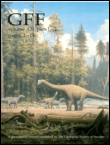
GFF
Advancing Earth Sciences Through Rigorous Research.GFF is a prestigious academic journal dedicated to advancing research in the fields of Geology and Paleontology. Published by Taylor & Francis Ltd in the United Kingdom, GFF serves as a vital platform for disseminating innovative findings and fostering discussions among researchers, professionals, and students alike. With a noteworthy impact factor reflecting its significance in the scientific community, GFF has achieved Q2 ranking in both Geology and Paleontology, underscoring its commitment to high-quality scholarship. The journal has been operational since 1872, accumulating a rich history of contributing to our understanding of earth sciences. It currently ranks #133 out of 321 in Earth and Planetary Sciences - Geology, and #50 out of 113 in Paleontology according to Scopus rankings. Although it does not offer an open access option, GFF remains accessible through various academic databases, ensuring that cutting-edge research reaches a wide audience. Its comprehensive scope aims to explore critical advancements in geological and paleontological sciences, making it an essential resource for those committed to exploring the intricacies of our planet’s past and present.
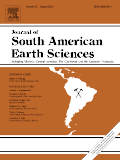
JOURNAL OF SOUTH AMERICAN EARTH SCIENCES
Connecting Past and Present in Earth SciencesJOURNAL OF SOUTH AMERICAN EARTH SCIENCES is a premier interdisciplinary journal dedicated to publishing high-quality research in the fields of Earth-Surface Processes, Geology, and Paleontology, making it an essential resource for scientists and researchers focused on South American geology and its diverse geological phenomena. Published by Pergamon-Elsevier Science Ltd in the United Kingdom, this journal has been instrumental in disseminating groundbreaking studies since 1988, showcasing contributions that push the boundaries of knowledge in Earth and Planetary Sciences. With an impressive Scopus ranking—positioning it in the 74th percentile for Paleontology and 71st for Geology—this journal not only reflects robust academic quality but also its commitment to addressing critical geological challenges in South America. Researchers will appreciate its objective of advancing understanding of geological processes while providing insights into past, present, and future Earth environments. Although available through traditional subscription models, the journal's vast repository of articles enriches the academic landscape, facilitating the sharing of vital research among professionals, students, and geological practitioners.
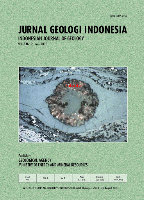
Indonesian Journal of Geoscience
Innovating Earth Sciences: Bridging Knowledge and Community.Indonesian Journal of Geoscience, published by the GEOLOGICAL AGENCY, is a vital platform for sharing cutting-edge research in the field of Earth and Planetary Sciences. With an ISSN of 2355-9314 and E-ISSN of 2355-9306, this open-access journal has been making significant contributions to the geoscientific community since its establishment in 2013. Operating out of Bandung, Indonesia, the journal is dedicated to disseminating high-quality research across diverse areas, making it an essential resource for researchers, professionals, and students alike. Recognized in the 2023 Q2 category in Earth and Planetary Sciences, it currently ranks #134/195 among general Earth and Planetary Sciences journals in Scopus, reflecting its growing prominence and academic rigor. The journal seeks to foster scientific discussions by publishing original research, reviews, and case studies that address contemporary challenges and advancements in geoscience, thus contributing to a deeper understanding of our planet. With its commitment to open access, the Indonesian Journal of Geoscience ensures that vital research is accessible to a global audience, encouraging collaboration and innovation in the field.

GEOSCIENCES JOURNAL
Innovating Solutions for a Sustainable Future.Welcome to the GEOSCIENCES JOURNAL, a pivotal publication in the fields of Earth and Planetary Sciences and Environmental Science, proudly presented by the Geological Society of Korea. Established in 1997, this journal has become a prominent platform for researchers, professionals, and students, offering a rich collection of peer-reviewed articles that explore a diverse array of geoscientific topics. With an impressive Q2 ranking in both Earth and Planetary Sciences and Environmental Science categories for 2023, it stands as an essential resource in the academic community. Though it operates under a traditional subscription model, GEOSCIENCES JOURNAL remains dedicated to advancing knowledge through rigorous research. Addressed from its headquarters in Seoul, South Korea, the journal aims to foster a deeper understanding of geosciences, encouraging innovation and collaboration in tackling today’s environmental challenges.

Austrian Journal of Earth Sciences
Advancing Knowledge in Geology and BeyondThe Austrian Journal of Earth Sciences, published by SCIENDO, is an esteemed open-access journal specializing in the disciplines of geology, paleontology, and stratigraphy. With an ISSN of 2072-7151, this journal has established itself as a significant platform for innovative research and scholarly communication in the earth sciences. Since its inception in 2007, it has continuously expanded its influence, achieving notable rankings in the Scopus database—#113 in Geology, #42 in Paleontology, and #21 in Stratigraphy, demonstrating its commitment to high-quality publications. The journal holds prestigious quartile rankings of Q1 in both Geology and Paleontology and Q2 in Stratigraphy as of 2023, reflecting its impact and relevance in the scientific community. Researchers and students alike are encouraged to explore and contribute to the evolving discourse within this dynamic field, as the Austrian Journal of Earth Sciences fosters collaboration and knowledge sharing across global platforms.
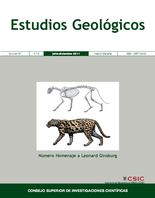
ESTUDIOS GEOLOGICOS-MADRID
Fostering Collaboration in Earth and Planetary Sciences.ESTUDIOS GEOLOGICOS-MADRID is a prominent journal in the field of geology, published by the esteemed Consejo Superior de Investigaciones Científicas (CSIC) in Spain. Established in 1976, this Open Access journal has been a vital resource for researchers and professionals since its inception. With an impact factor reflecting its contribution to the Earth and Planetary Sciences community, ESTUDIOS GEOLOGICOS-MADRID currently holds a Q3 category ranking in Geology as of 2023, showcasing its relevance and quality within the discipline. The journal publishes a diverse array of geological studies, ensuring wide-reaching access to significant research findings, thereby promoting collaboration and knowledge sharing. Established as a platform for both foundational research and applied geology, this journal fosters academic growth and contributes to understanding the Earth’s processes. Researchers, professionals, and students are encouraged to explore its extensive archive, which includes publications from 1976 to the present. For more information, visit the journal's editorial office at Editorial CSIC, C/VITRUVIO 8, 28006 MADRID, SPAIN.